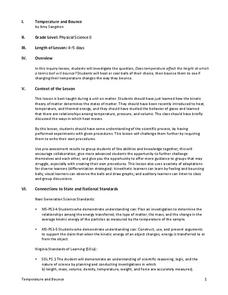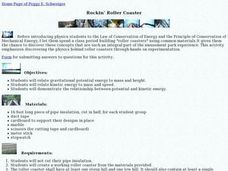Florida International University
Designing an Autonomous Underwater Vehicle (AUV): Concepts in Lift, Drag, Thrust, Energy, Power, Mass, and Buoyancy
Engineer an autonomous underwater vehicle (AUV) to study concepts of physics. Using household materials, collaborative groups design and build an AUV and then test Newton's Laws of Motion as they apply them in underwater environments...
Curated OER
Matter and Energy
Students participate in a small group read aloud of the short story, "Cerium" by Primo Levi. They answer several questions about the story and then relate the reading to a lecture on Kinetic theory. After the lecture they apply the...
Curated OER
Energy Conversion
Students describe how energy can be transformed from one form to another. In this physics lesson, students calculate kinetic and potential energy using mathematical equations. They give real life applications of this lesson.
Pennsylvania Department of Education
Pennsylvania’s Energy Supply
Third graders become familiar with the various types of energy and which types are found in Pennsylvania. In this Pennsylvanian energy resources lesson, 3rd graders, identify wind and water as sources of energy. Students complete an...
Curated OER
Energy Conservation
Learners complete a variety of activities as they examine forms of energy, use of energy, different technologies to harness energy and the ethical implications of these sources and technologies.
Curated OER
Can Races
Students participate in an experiment dealing with kinetic energy. They predict which cans they believe will win the can race and why. They answer questions based on the experiment.
Cornell University
Catapults
Ready, aim, fire! Launch to a new level of understanding as scholars build and test their own catapults. Learners explore lever design and how adjusting the fulcrum changes the outcome.
Rochester Institute of Technology
Skateboard Performance Testing
Perform an activity on performance testing with a lesson focused on the purpose of wheel bearings on skateboards. Learners conduct performance testing on a skateboard to collect and interpret data.
STEM for Teachers
Temperature and Bounce
Take part in a fun experiment and hold an impromptu bouncing contest with your class. Young scientists heat and cool balls before bouncing them to determine whether temperature changes affect how they bounce. The set of STEM lesson plans...
Curated OER
Rockin Roller Coaster
Students discuss gravitational potential energy, kinetic energy, and the relationship between potential and kinetic energy. They create a working roller coaster from provided materials and criteria then evaluate each roller coaster. They...
Virginia Department of Education
States of Matter
Scientists have been studying exothermic reactions before they were cool. The lesson begins with a discussion and a demonstration of heat curves. Scholars then determine the heat of fusion of ice and the heat needed to boil water through...
University of Texas
Lives of Stars
Stars exist from a few million years to over 10 billion years, depending on their mass. Scholars perform a play acting as stars to learn about their different life cycles. They develop an understanding of many of the fundamental concepts...
Curated OER
A Hilly Ride
Fifth graders investigate situations that show how kinetic and potential energy are exchanged. They determine how friction is a source of energy transfer from kinetic to thermal energy by experimenting with a car and track. They answer...
LABScI
Catapult: Flight of the Marshmallows
Watch your marshmallows fly. The engaging STEM activity has groups create a catapult to launch marshmallows. After testing their prototypes, they consider improvements and redesign their catapults.
Curated OER
Changes of State
Students examine molecules and the changes in energy of a system. For this energy systems lesson students complete a lab activity and describe changes of state.
Curated OER
Characteristics of Energy
Students explore Earth science by completing energy worksheets in class. In this energy forms lesson, students identify and define a list of energy vocabulary terms and a K-W-L chart. Students view a matter video clip in class and...
Virginia Department of Education
Soap, Slime, and Creative Chromatography
Do you think chromatography paper suffers from separation anxiety? Young chemists make soap, slime, silly putty, and experiment with chromatography in this lesson. The material includes clear instructions for each experiment along with...
Curated OER
FORCES, MOTION, AND ENERGY
Eighth graders engage in a variety of activities in order to investigate the basic concepts of physics. They read and answer questions in a written text. This is only one type of activity that is part of many others.
Curated OER
Introduction to Friction
Students study the properties of the frictional force between two surfaces in contact. They inspect various phenomena in nature where friction plays an important role and demonstrate
DiscoverE
Kicking Machine
Don't kick the resource to the curb; you'll definitely regret it. Future engineers devise a kicking machine that launches a ping-pong ball toward a target. They can use a pendulum, a rubber band, or both, depending on whether they want...
Cornell University
Catapult
Studying levers couldn't be more exciting! Learners build their own catapults and test the results as they make adjustments to the fulcrum. They compete against other groups to create the most accurate apparatus.
Curated OER
Domino Effect
Seventh graders investigate a change from potential energy to kinetic energy and discuss the concept of waves carrying energy. They, in pairs, work on an experiment which is guided by a worksheet imbedded in this plan.
Curated OER
Human Activity and the Environment 2004
Students brainstorm the ways we use energy sources in our daily lives and what our lives would be like without it. They answer questions based on sections from the Human Activity and the Environment 2004, "Energy in Canada" article.
Curated OER
Potential Energy Diagrams
In this reactions worksheet, students use graphs showing reaction progress to determine if the reaction is exothermic or endothermic, the activation energy, and the enthalpy of change. This worksheet has 1 graph, 7 short answer, and 16...

























